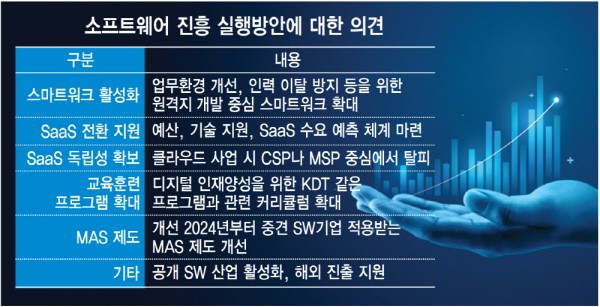Discusses Strategy and Direction with SW Association · Organization
Industry “Expansion of remote development urgent, need to introduce the SaaS activation policy”

Ministry of Science and ICT establishes a ‘mid-to-long term software strategy’
It is one of the main policies to develop the digital industry according to the ‘Korean Digital Strategy’ that was announced in September.
The Ministry of Science and ICT gathered the opinions of major associations and organizations such as the Korean SW Industry Association, Korea Commercial Software Association, etc. to come up with a mid-to-long term software strategy.
The Ministry of Science and ICT official said on the 31st, “We are currently in the stage of gathering opinions, and the direction for a detailed strategy has not been decided. The goal is to establish a plan within the year.”
SW Associations · Organizations suggested preparing a smart work activation policy centered around remote development.
According to the ‘Inspection Results of the Five Major Areas of 2021 Public SW Projects’ announced by the Ministry of Science and ICT in May, the execution rate of remote development of last year’s public SW projects reached only 22.1%. This was a result of limiting it to ‘the offices of the ordering company’. Even if they were to expand it to ‘inside and the outside (combined) of the ordering agency’ it would only have reached around 40.6%.
There is a desperate need to expand remote development in order to improve the working environment of the developer and prevent employee churn. The Ministry of Science and ICT is currently developing a remote development guideline alongside Korea SW Industry Association, etc. SW companies have demanded that it is necessary for the policies to be more than just a guide and be more compulsory.
An opinion was raised that called for a policy that activates the Software as a Service (SaaS) Industry. The demand for SaaS has risen alongside the expansion of cloud services. However, existing SW companies have difficulties in developing SaaS due to cost and technological issues. Cost and technological support is required.

Above all, the SW companies say that it’s difficult for them to begin developing, if they do not have the assurance that institutions will use it if the SaaS was developed. They asserted that there needs to be a system to predict the demand for SaaS.
Another suggestion was to establish separate orders for SaaS in the early stages so that they can sign a contract with the demanding institution separately from the Cloud Service Provider (CSP) or the Cloud Management Service Provider (MSP).
SW company official emphasized, “In order for the SaaS industry to develop, the CSP nor the MSP must not be able to dominate or control the SaaS company like the IT service – commercial SW company relationship in the past System Integration (SI) business.
There were many opinions about activating programs such as the K-Digital Training (KDT), a new digital technology training course to foster SW talent. There was also a lot of suggestions for increasing the curriculum that helps expand the SW manpower, such as no-code · low-code.
There were opinions that requested the improvement of the Multiple Supplier Agreement (MAS) system, which will be applied to mid-sized software companies from January 2024.
Mid-sized SW companies such as Tmaxsoft, Douzone Bizon, Ahn Lab, etc. must use the MAS system from January 2024, rather than a third-party unit price contract (private contract). Mid-sized SW companies have requested a revision of system improvements to prevent bleeding competition, such as lowering the bidding price.
Furthermore, there were requests for policies to revitalize the open SW industry, support for overseas expansion, etc. There weren’t as many opinions as expected regarding the long-standing SW industry issues, including raising the maintenance rate.
Reporter Ho-Cheon Ahn (hcan@etnews.com)